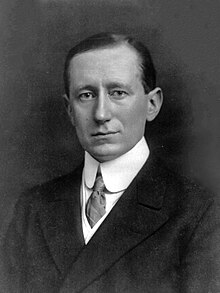
Back Guglielmo Marconi Afrikaans ጉልየልሞ ማርኮኒ Amharic Guglielmo Marconi AN غولييلمو ماركوني Arabic جولييلمو ماركونى ARZ Guglielmo Marconi AST गुल्येल्मो मार्कोनी AWA Qulyelmo Markoni Azerbaijani قولیئلمو مارکونی AZB Гульельма Марконі Byelorussian
This article's lead section may be too short to adequately summarize the key points. (September 2024) |
Guglielmo Marconi | |
|---|---|
 Marconi in 1908 | |
| Born | Guglielmo Giovanni Maria Marconi 25 April 1874 |
| Died | 20 July 1937 (aged 63) Rome, Kingdom of Italy |
| Alma mater | University of Bologna |
| Known for | |
| Spouses |
Beatrice O'Brien
(m. 1905; div. 1924) Maria Cristina Bezzi-Scali
(m. 1927) |
| Children | 5 |
| Awards |
|
| Scientific career | |
| Fields | Physics |
| Academic advisors | Augusto Righi |
| Member of the Senate of the Kingdom | |
| In office 30 April 1914 – 20 July 1937 | |
| Appointed by | Victor Emmanuel III |
| Signature | |
Guglielmo Giovanni Maria Marconi, 1st Marquis of Marconi GCVO FRSA (Italian: [ɡuʎˈʎɛlmo marˈkoːni]; 25 April 1874 – 20 July 1937) was an Italian[1][2][3][4] inventor, electrical engineer, physicist and politician known for his creation of a practical radio wave–based wireless telegraph system.[5] This led to Marconi being credited as the inventor of radio,[6] and winning the 1909 Nobel Prize in Physics with Karl Ferdinand Braun "in recognition of their contributions to the development of wireless telegraphy".[7][8][9] His work laid the foundation for the development of radio, television, and all modern wireless communication systems.[10]
Marconi was also an entrepreneur, businessman, and founder of The Wireless Telegraph & Signal Company in the United Kingdom in 1897 (which became the Marconi Company). In 1929, Marconi was ennobled as a Marchese (marquis) by King Victor Emmanuel III of Italy, and, in 1931, he set up Vatican Radio for Pope Pius XI.
- ^ "Guglielmo Marconi | Italian physicist". Encyclopædia Britannica. 21 April 2023.
- ^ "This week in tech". The Daily Telegraph. London. 28 April 2017. Archived from the original on 11 January 2022.
- ^ "Guglielmo Marconi". History. 27 March 2023.
- ^ Gavin Weightman, The Industrial Revolutionaries: The Making of the Modern World 1776–1914, Grove/Atlantic, Inc. 2010. p. 357.
- ^ Bondyopadhyay, Prebir K. (1995). "Guglielmo Marconi – The father of long-distance radio communication – An engineer's tribute". 25th European Microwave Conference, 1995. p. 879. doi:10.1109/EUMA.1995.337090. S2CID 6928472.
- ^ Hong, p. 1
- ^ "Guglielmo Marconi: The Nobel Prize in Physics". nobelprize.org. 1909.
- ^ Bondyopadhyay, P. K. (1998). "Sir J.C. Bose diode detector received Marconi's first transatlantic wireless signal of December 1901 (the 'Italian Navy Coherer' Scandal Revisited)". Proceedings of the IEEE. 86: 259. doi:10.1109/5.658778.
- ^ Roy, Amit (8 December 2008). "Cambridge 'pioneer' honour for Bose". The Telegraph. Kolkota. Archived from the original on 23 January 2009. Retrieved 10 June 2010.
- ^ "Marconi forged today's interconnected world of communication". New Scientist. New Scientist Ltd. Retrieved 28 June 2024.